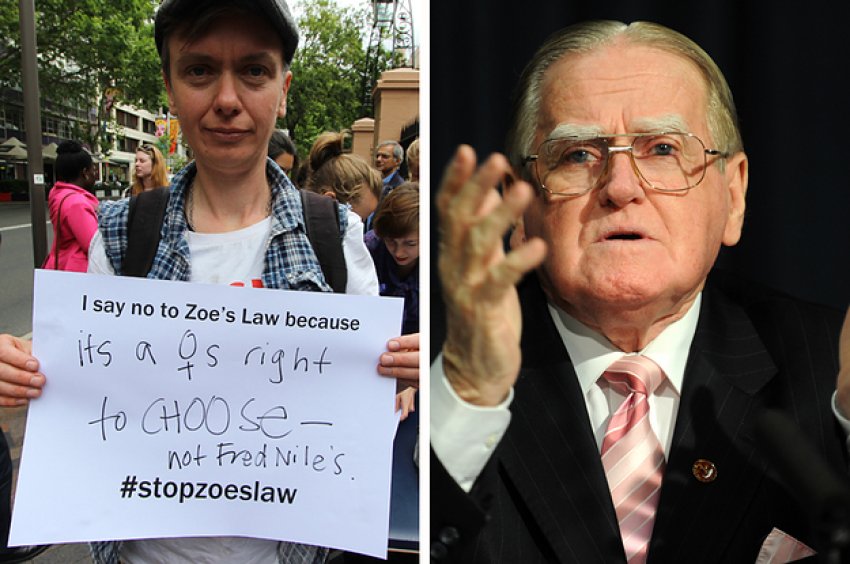
News that NSW MLC Fred Nile is using the last sitting weeks of state parliament before the March 2019 election to push his “Zoe’s law” bill — which would give foetuses legal rights — should alarm us all.
Women's rights activists emailed MPs and organised a snap action outside NSW Parliament on October 25, the day Nile tried, but failed, to introduce his private member's bill. Greens MLCs Cate Faehrmann and Jenny Leong and Labor MLC Penny Sharpe joined the action, committing to pursue reproductive choices and help organise a bigger protest on November 15 — the last sitting day Nile can try and bring back his bill.
This is Nile's third attempt to pass legislation that would criminalise women, and potentially their doctor, for having an abortion. Abortion is already criminalised under the Crimes Act in NSW.
Nile is opportunistically using the tragic case of a pregnant woman who was killed in a car crash on September 28 in Sydney’s west as an excuse to relaunch his quest for foetal personhood.
The driver responsible for the tragedy has been charged with 10 offences, including two counts each of manslaughter and aggravated dangerous driving occasioning death, negligent driving and driving unlicensed.
The bill seeks to change the definition of “grevious bodily harm” and “child in utero”.
The Crimes Act already penalises grievous bodily harm to a pregnant woman if her foetus dies as a result of assault or violence committed against her. The maximum sentence is 25 years’ jail.
But this is not Nile’s main objective: he believes life starts at conception and that, as a consequence, anyone involved in an abortion procedure is a criminal and should be punished.
Nile first tried to push his anti-choice law in 2010. It went through the Legislative Assembly in 2013 (63 votes to 26) with the support of current NSW minister for women Tanya Davies. Davies is a fan of Nile: in 2016, she praised him for “upholding the Judeo-Christian values of our society”.
The bill lapsed in 2014, but Nile reintroduced it the following year.
Put simply, Nile is trying to redefine what it is to be a “person” in NSW. The provisions outlined in an earlier version of the bill which exempted “anything done in the course of a medical procedure, or anything done by, or with the consent of, the pregnant woman concerned” are not enough to ensure there won't be future ramifications for women seeking a safe abortion in NSW.
There are also serious concerns regarding the use of the term “unborn child” in the bill, which is not only emotionally charged but also medically incorrect.
Some MPs, such as the Nationals’ Trevor Khan, have been persuaded that a foetal personhood bill is not a “stalking horse” to attack current laws governing abortion. Khan has submitted amendments to the bill that he says would safeguard access to abortion services. Faehrmann refuted that, saying "they will in some ways make the bill worse", potentially criminalising women for the "destruction of her foetus". She pointed to the US where the anti-choice movement was doing the same .
The NSW Bar Association, the NSW Law Society, Women Lawyers NSW, the Australian Medical Association, the Royal Australian and New Zealand College of Obstetricians and Gynaecologists and the NSW Greens have all warned against supporting any law that gives foetuses personhood rights. Their concerns include the legal ambiguity it would create and the possibility of women being criminalised for accessing abortion services.
Ironically, Khan was a co-sponsor with Sharpe of the safe access zone bill, which became law in June. Under this new law, it is an offence for people to harass others within 150 metres of a reproductive health clinic.
A bill that gives foetuses rights over the person carrying that foetus will clearly impinge on that person’s right to decide whether to bring it to term.
Access to abortion services is already constrained in NSW, particularly for poorer women and those living in remote parts of the state.
Division 12 of the Crimes Act (sections 82, 83 and 84) criminalises someone who attempts to procure abortion, with jail sentences of up to 10 years. Doctors who attempt to provide an abortion can also be sent to jail for 10 years.
As lawyers have pointed out, the Crimes Act has been amended to deal with people who commit grievous bodily harm to a pregnant woman if her foetus dies as a result of assault or violence committed against her.
But this is not enough for Nile and his supporters. He wants to establish a separate offence for conduct causing serious harm to, or the destruction of, a child in utero.
His mission is to give foetuses legal standing. It is a tried and tested back-door way of criminalising people who procure abortions. In the United States, anti-choice activists have been pushing for such “personhood” laws for years, with mixed success.
Nile has three more chances to have his bill debated in the Legislative Assembly. Private members bills are only discussed on Thursdays, and the list is decided on the previous day.
Pro-choice activists are already emailing NSW Legislative Council MPs and are ready to take action once they hear it is scheduled for debate.
Nowhere in Australia does a foetus have a separate legal status to that of a woman. If passed, the bill will put access to reproductive health care in NSW at greater risk. This would not only affect women’s decisions to have an abortion; other medical choices around pregnancy and birth will be placed at risk of being criminalised.
The intended and unintended consequences of such a law would be far-reaching and devastating.
[Join the action on November 15 outside Parliament House.]